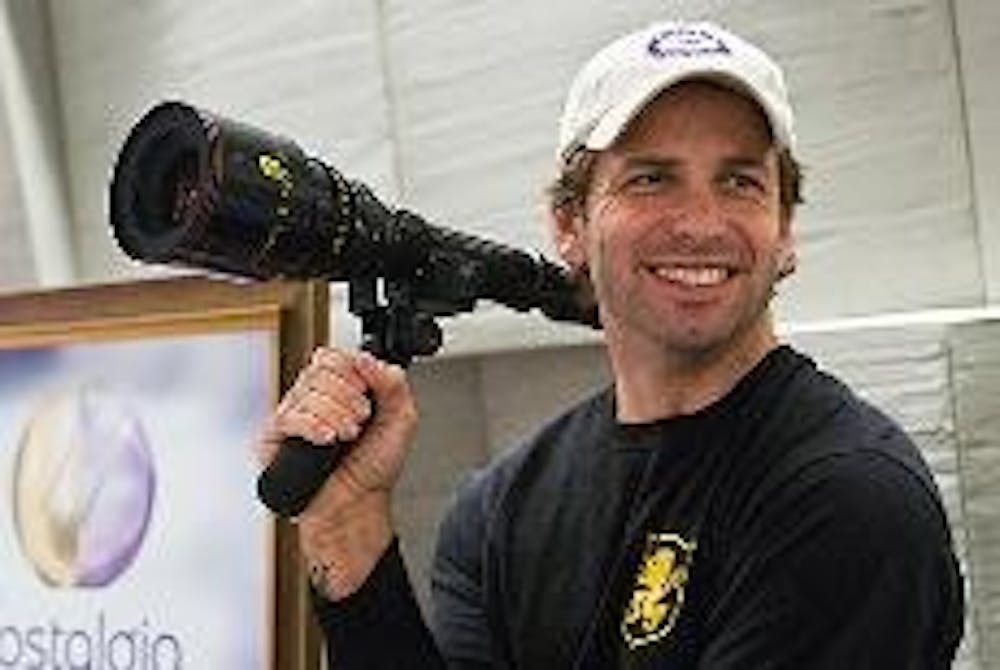In case you have not seen Zack Snyder's "Watchmen," which garnered an A- from The Eagle, go now - do not pass go and certainly do not collect $200. The film is a work of sheer brilliance on its own and, perhaps more importantly, it is the most faithful adaptation ever conceived and quite probably the most faithful adaptation that could possibly be made. If any literary work truly deserves such dedication and respect, it is Alan Moore's masterpiece - a Hugo Award winner, included in Time Magazine's top 100 works of the 20th century and generally acknowledged as the greatest graphic novel ever written. By all accounts, Zack Snyder agrees. In a phone interview with The Eagle, he displayed the fanboy devotion he has to the original work in every question answered and every personal anecdote.
Snyder describes himself as a giant fan of Moore, having read "Watchmen" in college during the late '80s shortly after the graphic novel came out in 1985. Snyder's very first question upon taking the job to direct "Watchmen:" when do I get to talk to Moore? The answer to that, unfortunately, was never, as Moore had asked not to be contacted by the filmmakers, a fact that - in true fanboy fashion, in Snyder's words - "deeply bummed him out."
Of course Snyder is more than just a fan, and he was also able to reflect on "Watchmen" as a filmmaker. Without Moore's input, he was left on his own to create the film.
"[I] had to founder through my own experiences," he said. It was a reality that perhaps lead to a "truer experience" in creating the film, one that was based off his vision as a fan, an audience member telling a story with none of the prejudice or destructively obsessive filmmaking one might have in a film Moore himself was involved in making.
Snyder said Warner Brothers approached him to direct the film because of his record making movies based off of comics that includes directing Frank Miller's "300."
Originally apprehensive about adapting what has been called an unfilmable film, Snyder eventually decided he would take on the task. The desire to make the movie came in large part due to Snyder's dedication to the original work, especially when he read the script Warner Brothers showed him. While not as important to those who aren't fans of Moore's work, those who are might be incensed to learn that the original script called for a PG-13 rating (the finished movie is rated R for nudity and explicit violence).
Incomprehensibly, the script had called for a movie that could be sequeled. Devoted fans of "Watchmen" know that it is not a story that can - or at least should - be sequeled, serialized or otherwise tainted. Set in modern times, it called for Doctor Manhattan going not to Vietnam but to Iraq, a big, sexy, high-octane blasphemy against everything a masterpiece like Moore's work deserves.
"[I] couldn't let it happen that way," Snyder said.
Snyder agreed to make the film in order to prevent "Watchmen" from becoming a superhero movie, he said. "Watchmen," Snyder said, is anything but a formulaic superhero movie. Instead, it is something transcendent of its genre and medium.
Of course, superheroes have powers and fight; "Watchmen" is no exception. "Watchmen" is an incredibly violent movie, but not violence for the sake of violence, according to Snyder. The violence is far more personal than Snyder's other works, like "300."
"Watchmen's" violence is "very specific to provoke thought," he said.
Snyder said the violence is so extreme because he wanted to fulfill the graphic novel's promise to see the superhero genre, movie or graphic novel, "broken down at every level." The style of previous superhero movies targeted towards kids that portray superhero stories as easy and pain-free was something Snyder wanted to smash "as hard as I could."
When it came to the adaptation, there were a few "big thematic things that I wanted to get at," Snyder said, referring to the challenges of transferring Moore's words and artist Dave Gibbons' images to the screen. For the most stalwart of Moore's fans who disagree with Snyder's decision to change the infamous ending of the graphic novel, Snyder explained a need to simplify the story. Remaining perfectly faithful to the ending would have meant far more detail than Snyder had time to show, causing him to "lose a lot of character."
Of course, "Watchmen" the movie is not the same thing as "Watchmen" the graphic novel. For Snyder, the most obvious difference is the real feel of the characters. While Snyder described what happened to Rorschach in the graphic novel as not particularly emotional, the movie makes that moment and many others "no longer philosophy," but instead as powerful moments with very real characters.
You can reach this writer at thescene@theeagleonline.com.





